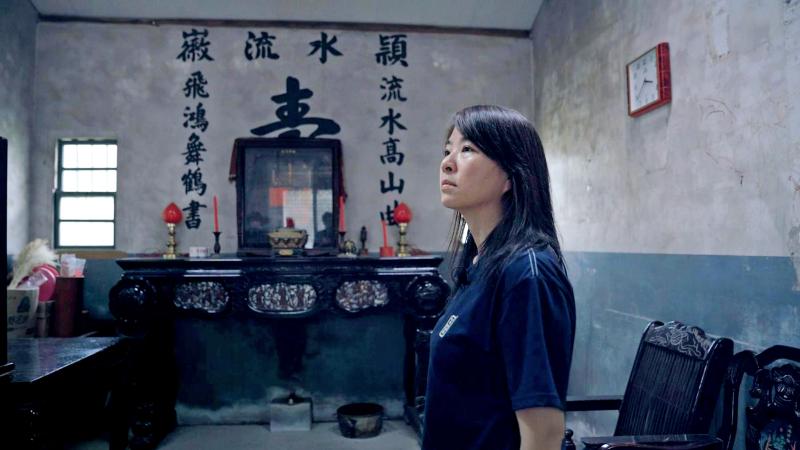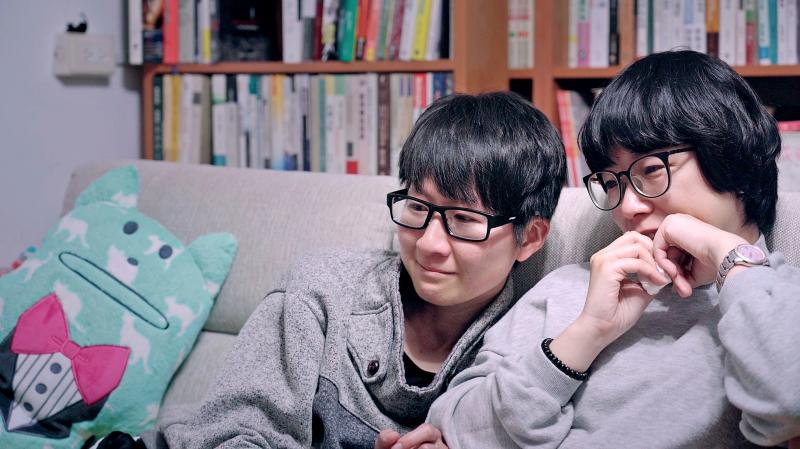There’s plenty of tears in this intimate, highly-emotional documentary about six female business owners on a street that’s not even shown on Google Maps. They all seem to harbor some past burden and the little shops seem to be their refuge, and director Yang Li-chou (楊力州) digs deep into their pain — but perhaps a bit too much as Love Without Clutching, Leave Without Guilt (愛別離苦) fixates on the sob factor and fails to tell a coherent story.
The tale of Lingtan Street (菱潭街) in Taoyuan’s Longtan District (龍潭) mirrors that of countless once-derelict areas in Taiwan: abandoned for 14 years, it went through a “cultural creative” revival and now hosts cute shops in the redone storefronts. Yang originally set out to tell this story of its rebirth, mostly speaking to men. However, the ideas of young people returning home and community revitalization didn’t excite him and he nearly abandoned the project. Yet the place kept drawing him back, and he finally decided to depict the lives of these resilient women who carry on despite business being virtually nonexistent, exacerbated by the pandemic.
The Chinese title refers to one of the eight great sufferings in Buddhism: the pain of being separated from the ones you love. Trinket store owner Momo came from a traditional Hakka household that discriminated against girls, yet she’s the one dealing with all sorts of family tragedy; bookstore owner Jia-hua wants to marry her lesbian partner; soapmaker Pei-pei’s ex-husband has barred her from seeing her son since he was an infant, but the now-teenaged boy secretly visits her at her shop.

Photo courtesy of Back Stage Studio
Yang’s film is pretty much a montage of these women’s stories, providing a glimpse into the buried inner world of ordinary women, and manages to unearth events and emotions from their past that speak to the common struggle of being a woman in a patriarchal society. This is much harder to film than just a story of the street’s revival, and it’s impressive that he got the subjects to candidly share with the public such personal stories.
Yang’s voice is often heard in the film, chatting with his subjects. In one scene, he shows Jia-hua and her partner Chen Miao footage of Jia-hua’s mother discussing her daughter’s sexuality. This is a subject Jia-hua has never broached with her mother, and she is moved to tears after watching it. For this reviewer, this is unnecessary interference in the subject’s life. Ethics aside, there is no need to create even more sentimentality when there is already more than enough. The cheesy montages of the subjects crying are overkill.
The colorful animated illustrations by Miss Charlie (查理小姐) are a nice touch, however, injecting some whimsy into the film.

Photo courtesy of Back Stage Studio
Overall, it feels like featuring six people is too much for its 77 minutes of running time, especially as Yang also includes day-to-day scenes of the street such as birthday parties and temple festivals. There’s obviously a few women whom Yang manages to get closer to, and it would have worked better to focus on them and flesh out their characters more.
Finally, the film fails to capitalize on what binds these women together: their persistence to remain in business on Lingtan Street, even when the meager profits aren’t enough to pay their bills. Failing to recruit a single student one month, piano teacher Chu-chun moonlights as a masseuse and cleaner to stay afloat.
So what does this place mean to them? What power does it hold over them? Of course there’s warmth and a sense of belonging here, as some of them are seen shopping, eating and watching the 2020 presidential election together. But there just could have been more to tie the characters directly back to the street, which was the original impetus for filming.

Photo courtesy of Back Stage Studio

Last week Elbridge Colby, US President Donald Trump’s nominee for under secretary of defense for policy, a key advisory position, said in his Senate confirmation hearing that Taiwan defense spending should be 10 percent of GDP “at least something in that ballpark, really focused on their defense.” He added: “So we need to properly incentivize them.” Much commentary focused on the 10 percent figure, and rightly so. Colby is not wrong in one respect — Taiwan does need to spend more. But the steady escalation in the proportion of GDP from 3 percent to 5 percent to 10 percent that advocates

A series of dramatic news items dropped last month that shed light on Chinese Communist Party (CCP) attitudes towards three candidates for last year’s presidential election: Taiwan People’s Party (TPP) founder Ko Wen-je (柯文哲), Terry Gou (郭台銘), founder of Hon Hai Precision Industry Co (鴻海精密), also known as Foxconn Technology Group (富士康科技集團), and New Taipei City Mayor Hou You-yi (侯友宜) of the Chinese Nationalist Party (KMT). It also revealed deep blue support for Ko and Gou from inside the KMT, how they interacted with the CCP and alleged election interference involving NT$100 million (US$3.05 million) or more raised by the

While riding a scooter along the northeast coast in Yilan County a few years ago, I was alarmed to see a building in the distance that appeared to have fallen over, as if toppled by an earthquake. As I got closer, I realized this was intentional. The architects had made this building appear to be jutting out of the Earth, much like a mountain that was forced upward by tectonic activity. This was the Lanyang Museum (蘭陽博物館), which tells the story of Yilan, both its natural environment and cultural heritage. The museum is worth a visit, if only just to get a

More than 100,000 people were killed in a single night 80 years ago yesterday in the US firebombing of Tokyo, the Japanese capital. The attack, made with conventional bombs, destroyed downtown Tokyo and filled the streets with heaps of charred bodies. The damage was comparable to the atomic bombings a few months later in August 1945, but unlike those attacks, the Japanese government has not provided aid to victims and the events of that day have largely been ignored or forgotten. Elderly survivors are making a last-ditch effort to tell their stories and push for financial assistance and recognition. Some are speaking